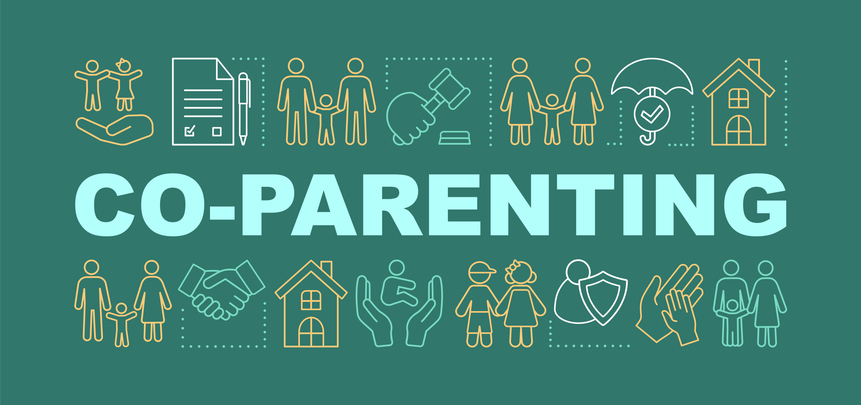The foundation of a child’s security is based on the loving connection between Mom and Dad. Even when the marriage is imperfect, or conflicted, children instinctively want the source of their security to remain intact. Research has shown that the only time kids want their parents to separate is when there is domestic violence or sexual abuse. Yet, many couples choose divorce rather than learning the communication and conflict management skills that would enable a loving, lasting marriage to be their experience. Co-parenting challenges are a consequence of many divorces. Unfortunately, parents who are more concerned with “winning” or “getting my rights” use the children as a battlefield to extend the issues that caused the marriage to fail. These are the horror stories we hear that make children the victims of adult power plays.

Fortunately, I’ve heard some amazing examples that demonstrate principles and practices that, when employed, reduce the damage done to the children. All of these examples are based on making the wellfare of the child the highest priority following a divorce.
It Takes Sacrifice
Even healthy, stable parenting requires sacrifices that we may not have anticipated when dreaming of the joy of having a baby! Nights without sleep, exchanging independence for meeting the needs of a child, the struggle of managing priorities, schedules, meals and playdates may surprise us. The fallout issues from divorce only multiplies the need for unexpected sacrifices.
I interviewed Elisabeth Stitt about the sacrifices she chose to minimize the suffering of her daughter following her parents’ divorce. You can hear her inspiring testimony here. Episode #42. Today her daughter is a self-confident young adult who happily considers her dad, step-mom, half sister, mother, step-dad and step-siblings all part of her family. Her father and steps are included in her birthday parties, school events, etc. without any negative drama.
Dealing With a “Crazy Ex”
The first rule of dealing with an Ex is that you never, ever speak badly about your Ex to your child. You may tear your hair out with the difficulties created by requests to change a schedule, or demands for more child-support. But these issues are between the adults and should not be known to the child. I admire Ann and Brian, for instance. His Ex frequently asks for changes in the schedule to accommodate her “needs” and has taken them to court several times to demand more support. Brian does not discuss or complain about these disruptions with his children.
Elizabeth Einstein creator of Active Steparenting for Stepfamilies says, “Children can cope with two different homes and sets of rules if they don’t have to choose which is best.” Several couples I’ve worked with have despaired at the lack of reasonable boundaries in the households of their Exes or been frustrated by the Exes attempts to block their child’s relationship with them. The best examples have kept the frustrations between the adults, and not vented their frustrations to the children. Although the Ex’s household is chaotic and undisciplined, Brian and Ann provide a quiet, happy home with reasonable rules and consequences lovingly administered.
You can hear an interview with Kip and Wendy. (Episode #17) When they married they had six teenagers between them. Kip and Wendy’s parenting styles were different, but they didn’t try to impose their styles on each other. They remained single parents to their own children. If Wendy’s girls went to Kip to ask permission for something, he’s answer, “Go ask your mother. She’s in charge of you.”
Personal Behavior Boundaries
In the beginning of their co-parenting, both Justin and James had very disrespectful communications with their Exes. Soon James would respond to his Ex’s digs with, “I’m not going to fight with you about this. I will only discuss how to give our children what they need.” Recently at a joint celebration of their daughter’s graduation, his Ex again tried to trigger a disagreement. James simply ignored the comment. Justin eventually learned to not repond to his Ex’s vitriole on phone messages or voice mail. He only responded when a request was asked respectfully. Soon the angry messages diminished. The latest I’ve heard is that their relationship and co-parenting practices are civil.

Lessons learned: Trying to respond reasonably to an unreasonable or attacking communication doesn’t work. ANY response only feeds the fire of more conflict.
Sometimes communication with an Ex can trigger problems with the current marriage. Then your current partner needs to write out these sentence stems: “I feel torn between…I feel left out when…I feel powerless when…If we continue doing it this way, I am afraid that…I feel insecure when you…” Then ask to share these feelings with your partner. Boundaries may be needed to protect the security of your current marriage. Things such as, “I’ll only talk with my Ex when you know and agree to the need for the conversation.” Or, “When I pick up my child, I’ll wait outside the front door.” Or, “You can check my text messages any time you want to.”
Modeling a Healthy, Happy Marriage
Gavin and Pamela’s marriage was their third each. They returned from their honeymoon to find service notices for two new law suits from Gavin’s Exes! Previous marriages had been charcterized by emotional abuse, addictions, or mental illness. They were devastated when their own marriage became filled with conflict over their different parenting styles. In desperation, they were willing to adopt this rule: they would each be in charge of their own children (two each) and neither would criticize or interfere with the parenting of the other’s children. The fighting immediately stopped. They went on to attend a Stepping TwoGether six week class where they learned more respectful ways of communicating. This is Pamela’s report: “The love we knew was buried under everything has returned in force. We’ve gone on romantic dates! The kids have calmed down. The whole family had been divided in half, but now relationships between the kids are healing. There is laughter in our house again.”
Brian’s children are discovering that they prefer living in his peaceful, loving home even though there are rules and consequences! Due to some documented abusive events and parental neglect, the children are asking Brian to get full custody.
Keep Your Agreements
To the best of your ability, keep your end of the co-parenting agreements even though your Ex may not be as committed to keeping his or hers. Be as cooperative as you can whenever it is in your child’s best interests to change your custody days, for instance. When your hot buttons get pushed, like only an Ex knows how to do, vent your anger away from your children. In spite of whatever challenges or road blocks your Ex tosses your way, remind yourself frequently that making choices that make co-parenting as stress free as possible for your child is your highest priorty.
You have my love and support,

